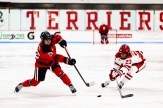Northeastern has won 10 straight women’s rowing championships, but coach Joe Wilhelm wants to go faster still
“We want to see this program elevate to be one of the top 10 teams in the country,” says Wilhelm, whose Huskies have been training in anticipation of the annual Head of the Charles Regatta.
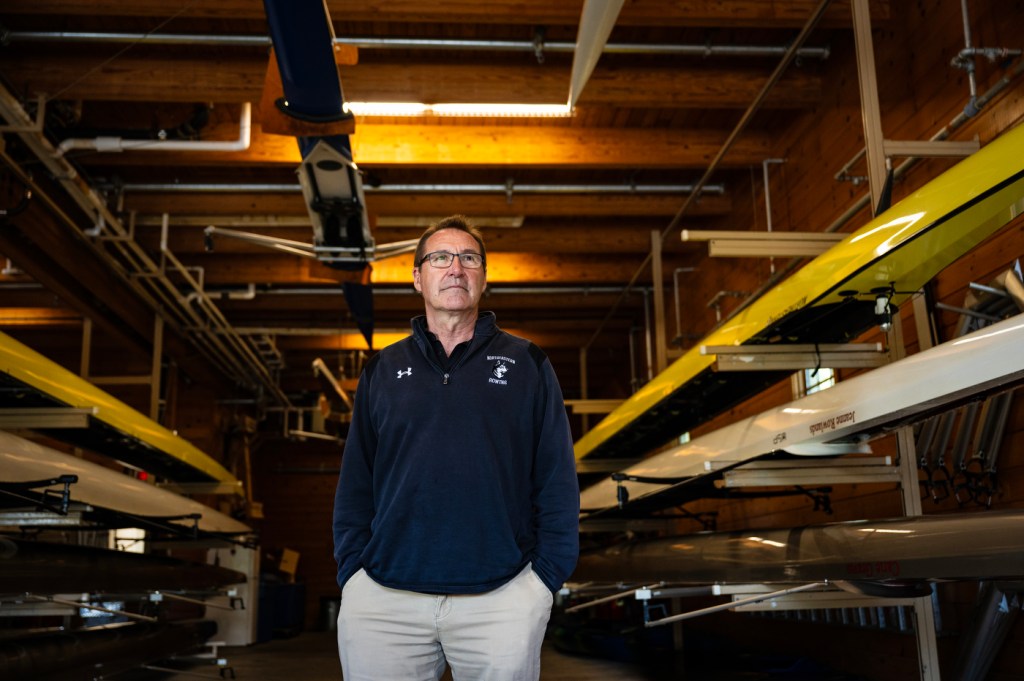
Joe Wilhelm has coached Northeastern University to 10 straight Coastal Athletic Association championships in women’s rowing. It is a remarkable achievement. But then again …
“We’re not satisfied at all,” Wilhelm says as he begins his 27th season as the Huskies’ head coach. “People ask, ‘How do you continue to do this?’ And I say it’s because we’re not trying to win the conference. This isn’t the goal.”
The Huskies have placed 18th at the past two NCAA Regattas — their best results since 2017. But Wilhelm’s objective is to go faster.
“We want to see this program elevate to be one of the top 10 teams in the country,” says Wilhelm, whose Huskies have been training in anticipation of the annual Head of the Charles Regatta Oct. 19-20. “We’ve been moderately successful in doing that. We’re winning our conference, we’re getting to the NCAA and we’re top 20. But our goal is to take that next step.”
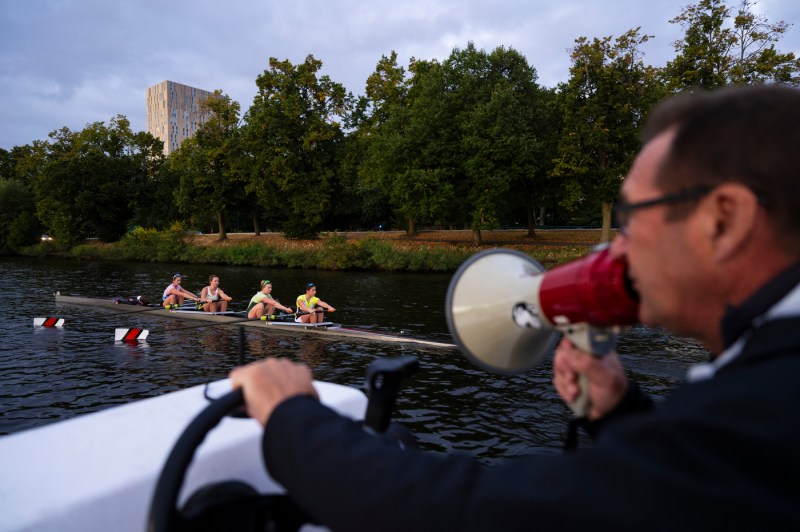
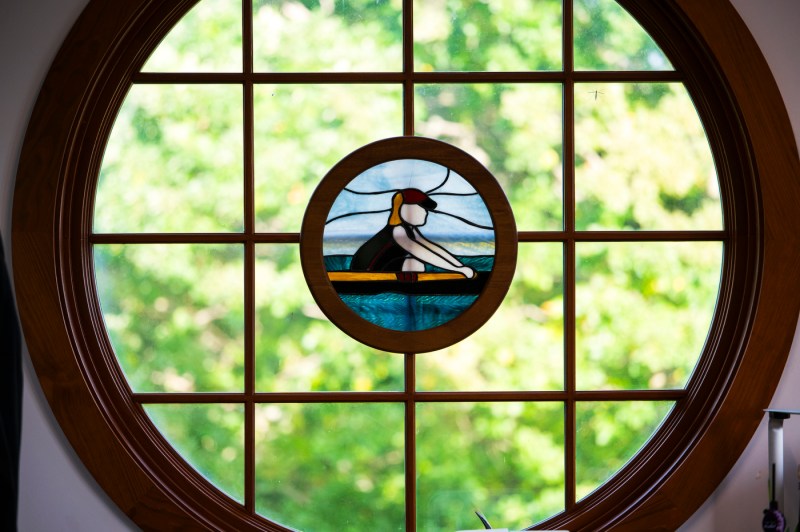
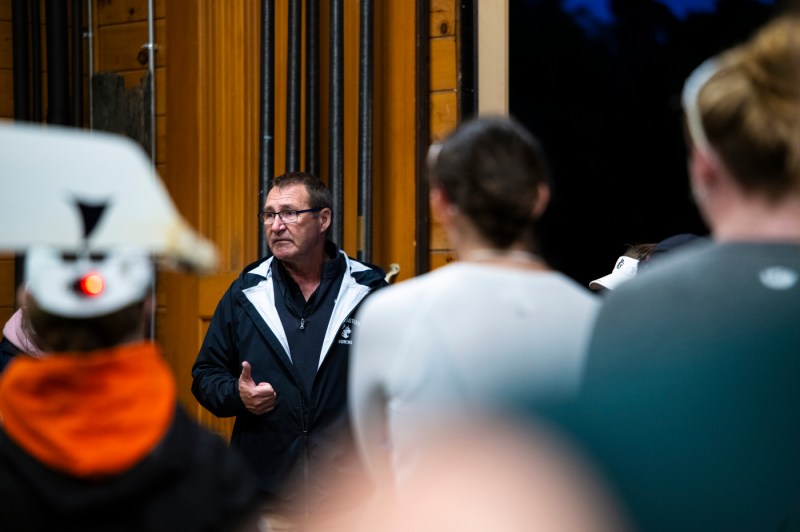
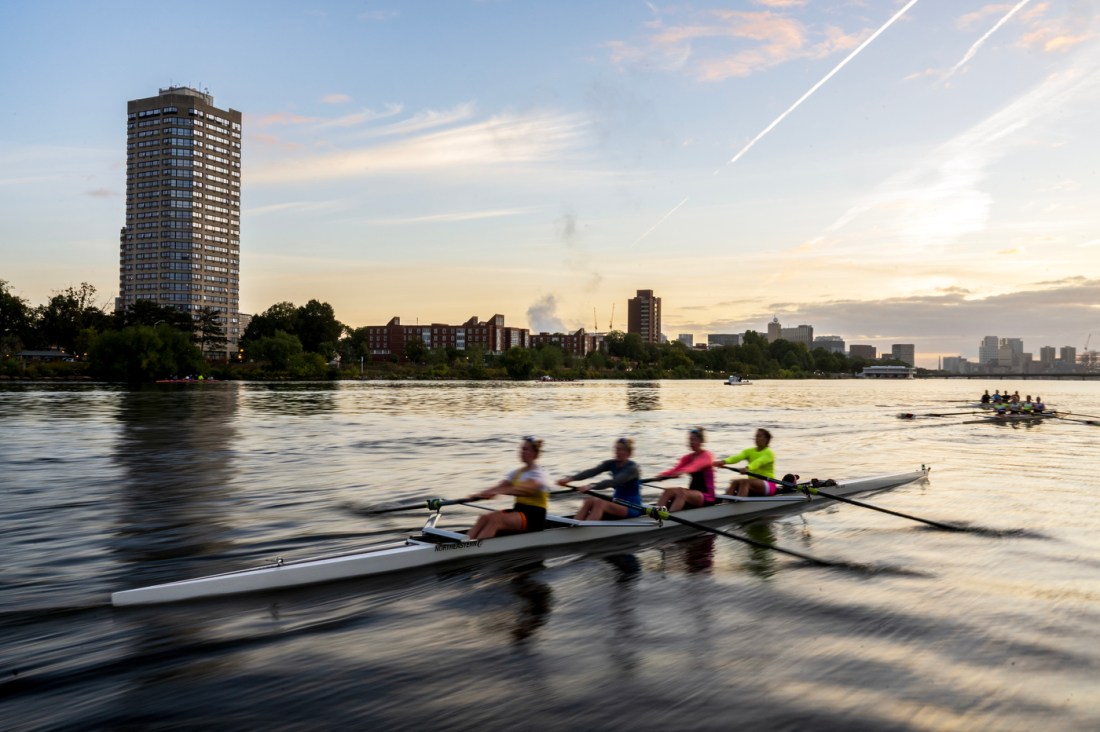
Those upper-tier programs are all chasing the prototypically tall rowers who use their length to create leverage on the water. Wilhelm seeks to recruit them, of course, but he also believes there are other forms of leverage.
“I can tell you that I don’t use height as a standard when I’m recruiting or coaching athletes, that’s for sure,” says Wilhelm, who stands just under 6 feet tall — relatively short for competitive rowing. “Just because of what I went through, I know that there are a lot of people who can move boats and don’t fit that mold.”
He is constantly reminding his rowers of their potential to exceed expectations.
“He’s quite fantastic at motivational speeches,” says senior coxswain Camille Arnold-Mages. “There was one point in the [last] season where we were slightly intimidated by the height difference between us and the other crews. Joe sat us down and said it doesn’t matter, that at the end of the day it’s whoever can put the most bend behind the stick. And I think that [mindset] has helped us, especially when it comes to conference championships.”
Wilhelm says his program offers multiple scales of success.
“We’re proud of the fact that we have as many doctors and lawyers among our alums as we have national team members,” he says. “We’re trying to make sure that we can help them whatever their goals are. If they want to have a great collegiate experience and then go on to grad school or get a job, we can help them with that; or if they want to use their time here to springboard them to row at the World Championships, we can help with that too.”
Madison Mailey, who won a gold medal with the Canadian women’s rowing team at the Tokyo Olympics in 2021, is grateful for her years of growth while rowing at Northeastern (2015-18).
“Joe Wilhelm has been one of the most influential figures in my life,” Mailey says. “His unwavering passion for rowing and his dedication to coaching extend beyond developing athletes; he nurtures his student-athletes as individuals. I feel incredibly fortunate to have had a coach so deeply invested in my growth, always striving for those 1% improvements.
“For Joe no day was ever a write-off. He expected us to approach every practice with the intensity of race day. His favorite quote, ‘We are what we repeatedly do. Excellence then is not an act but a habit,’ perfectly encapsulates his philosophy.”
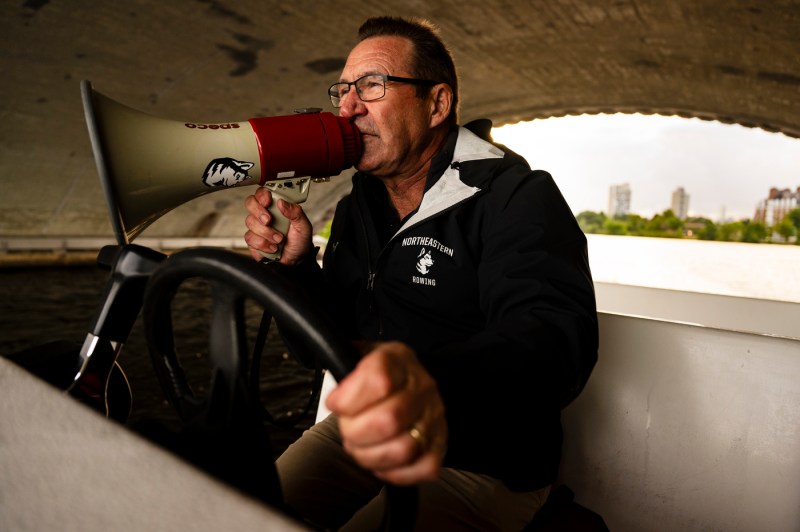
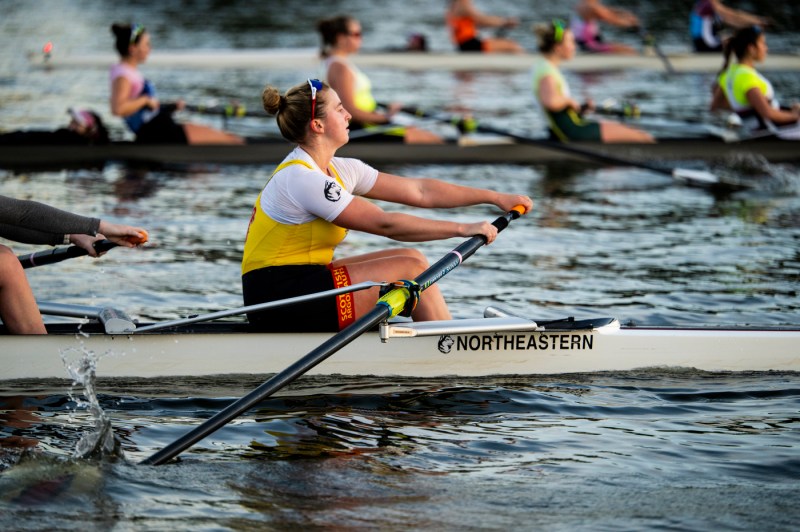
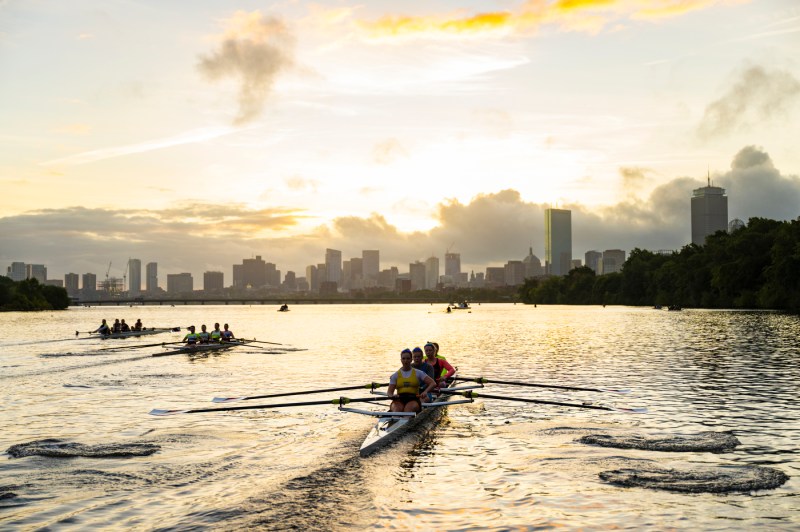
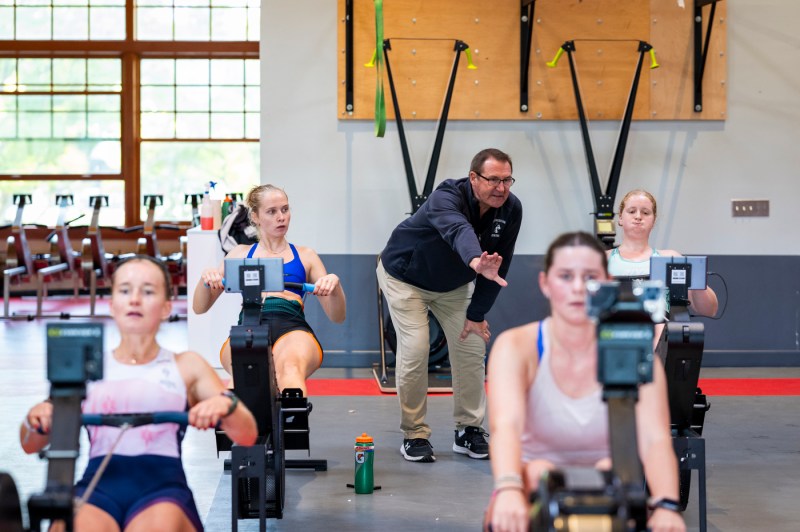
Wilhelm grew up in St. Catharines, Ontario, a global capital of rowing where all 13 high schools had a team. That’s where the sport first made sense to him.
“I tried other sports in high school,” says Wilhelm, who went on to captain the 1982 crew at the University of Pennsylvania. “I tried to play basketball but no matter how hard I worked, I was not good at basketball. Rowing is a pretty pure sport in that the harder you worked, the fitter and stronger you got, the faster the boat went.
“That was something that really appealed to me — and it appeals to me as a coach. The people that we get coming to Northeastern, they want to be successful. They want to be successful academically, they want to be successful rowing, they’re very motivated individuals. It’s a matter of letting them know what it takes to be a successful Division 1 student-athlete, and once they understand what it takes, most of them are motivated to do it.”
Wilhelm didn’t necessarily see his future in rowing. He made the Canadian national team “by accident,” he says, while competing to help a friend who was trying out.
“A lot of the guys that I rowed with in Canada ended up winning the Olympic gold medal that year,” Wilhelm says. “So I kind of think I retired a year too soon, though I don’t know if I would have made that boat anyway.”
He fell into coaching as a graduate assistant at Columbia to help pay for the MBA he was pursuing. “I found myself spending a lot more time thinking about — and loving — the coaching side of it,” says Wilhelm, who spent eight years at Columbia before moving to Northeastern.Wilhelm’s tenure at Northeastern began with seven years as an assistant to legendary men’s coach Buzz Congram. In 1999, he shifted offices to take command of the women’s team.
“I wanted to be a head coach,” says Wilhelm, who had served as coach of the Columbia women’s team during its inaugural season. “What I found was at this age — 18, 19, 20 years old — women tend to be more mature than men emotionally and psychologically. And they are every bit as motivated and competitive as men are.”
Featured Posts
A big difference, says Wilhelm, is that female rowers tend to be more interested in the details.
“Women want to know the why and the how,” Wilhelm says. “With men I think sometimes it can be a little harder to get your point across because they’re just so focused on going as hard as they can and as fast as they can all the time. Women want to understand how they can get to the next level: How do I take the next step? They tend to be more introspective about it.”
Wilhelm believes he has improved his communication skills while also learning to rely on associate head coach Andrew Wieler and assistant coaches Ariel Handler, Richard Nary and John Inman to provide different perspectives to the student-athletes. It’s part of Wilhelm’s drive to keep improving.
“He’s not afraid to adapt and change,” says Handler, who also serves as the team’s recruiting coordinator. “When Joe started rowing, they didn’t have rowing machines and the boats were made of wood; now they’re made of carbon fiber and the metrics have changed.
“Every year people are getting faster and faster, and Joe has stayed on the cutting edge of all of that. I think that’s made him successful as well as his ability to care about the athletes and the people who work for him. It’s nothing but support from his side and that helps people grow and flourish.”
Wilhelm operates a lean team of 50 rowers that suffers little of the turnover experienced by larger programs.
“Even though we’re one of the smaller teams in the country in terms of numbers, I also think we’re one of the deeper teams,” says Wilhelm, who rarely recruits walk-ons. “We have 45 to 50 really good athletes on the team who rowed in high school and who have come here to get better.”
He came to Northeastern with the same aspiration. It’s driving him even now.
“Our goal is to be competing against the top-level schools from the major conferences,” Wilhelm says. “If we can recruit the athletes that we think we should be able to recruit and we can maximize their potential, we’re going to be really, really fast.”







